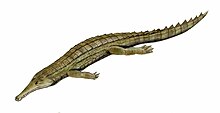Elosuchus
| Elosuchus Temporal range:
| |
|---|---|

| |
| Skull of E. cherifiensis | |
| Scientific classification | |
| Domain: | Eukaryota |
| Kingdom: | Animalia |
| Phylum: | Chordata |
| Class: | Reptilia |
| Clade: | Archosauria |
| Clade: | Pseudosuchia |
| Clade: | Crocodylomorpha |
| Clade: | Crocodyliformes |
| Family: | †Pholidosauridae |
| Genus: | †Elosuchus de Broin, 2002 |
| Species | |
| |
Elosuchus is an extinct genus of neosuchian crocodyliform that lived during the Middle Cretaceous of what is now Africa (Niger, Morocco and Algeria).
Description and taxonomy
[edit]Elosuchus had an elongated snout like a gharial and was probably a fully aquatic animal. The type species, E. cherifiensis from Algeria and Morocco, was originally described as a species of Thoracosaurus by Lavocat,[2] but was recognized as a genus separate from Thoracosaurus by de Broin in 2002. Elosuchus felixi, described from the Echkar Formation of Niger, was renamed Fortignathus in 2016 and is either a dyrosaurid relative or a non-hyposaurine dyrosaurid.[3][4] The largest known skull indicates a body length of up to 7.7 metres (25 ft 3 in).[1]
Phylogeny
[edit]
de Broin (2002) created the family Elosuchidae to contain Elosuchus and the genus Stolokrosuchus from Niger.[3] However, recent phylogenetic analyses usually find Stolokrosuchus to be one of the basalmost neosuchian, only distantly related to Elosuchus.[5][6][7][8] Some analyses find a monophyletic Pholidosauridae that includes Elosuchus,[7] while other analyses find Elosuchus to nest with taxa like Sarcosuchus in a clade as a sister-taxon to the node Dyrosauridae+Pholidosauridae.[6][8]
References
[edit]- ^ a b Louise M. V. Meunier; Hans C. E. Larsson (2016). "Revision and phylogenetic affinities of Elosuchus (Crocodyliformes)". Zoological Journal of the Linnean Society. 179 (1): 169–200. doi:10.1111/zoj.12448.
- ^ Lavocat, R., 1955, Decouverte d'un Crocodilien du genre Thoracosaurus dans le Cretace Superiuer d'Afrique: Bulletin du Museum National d'Historie Naturelle, Paris, v. 2, n. 27, p. 338-340.
- ^ a b de Broin, F. de L., 2002, Elosuchus, a new genus of crocodile from the Lower Cretaceous of the North of Africa: C. R. Palevol, v. 1, p. 275-285.
- ^ Mark T. Young; Alexander K. Hastings; Ronan Allain; Thomas J. Smith (2016). "Revision of the enigmatic crocodyliform Elosuchus felixi de Lapparent de Broin, 2002 from the Lower–Upper Cretaceous boundary of Niger: potential evidence for an early origin of the clade Dyrosauridae". Zoological Journal of the Linnean Society. Online edition. doi:10.1111/zoj.12452.
- ^ Turner, Alan H.; Sertich, Joseph J. W. (2010). "Phylogenetic history of Simosuchus clarki (Crocodyliformes: Notosuchia) from the Late Cretaceous of Madagascar". Journal of Vertebrate Paleontology. 30 (6, Memoir 10): 177–236. doi:10.1080/02724634.2010.532348. S2CID 86737170.
- ^ a b Marco Brandalise de Andrade; Richard Edmonds; Michael J. Benton; Remmert Schouten (2011). "A new Berriasian species of Goniopholis (Mesoeucrocodylia, Neosuchia) from England, and a review of the genus". Zoological Journal of the Linnean Society. 163 (s1): S66–S108. doi:10.1111/j.1096-3642.2011.00709.x.
- ^ a b Daniel Fortier; Daniel Perea; Cesar Schultz (2011). "Redescription and phylogenetic relationships of Meridiosaurus vallisparadisi, a pholidosaurid from the Late Jurassic of Uruguay". Zoological Journal of the Linnean Society. 163 (s1): S66–S108. doi:10.1111/j.1096-3642.2011.00722.x.
- ^ a b Bronzati, M.; Montefeltro, F. C.; Langer, M. C. (2012). "A species-level supertree of Crocodyliformes". Historical Biology. 24 (6): 598–606. doi:10.1080/08912963.2012.662680. S2CID 53412111.



